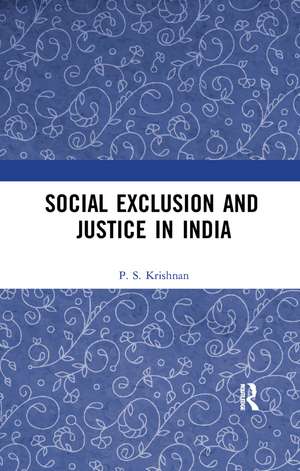Social Exclusion and Justice in India
Autor P. S. Krishnanen Limba Engleză Paperback – 28 mar 2019
- examines the caste system and its socio-economic ramifications from the perspective of Dalits, and Socially and Educationally Backward Classes;
- explores the nuances of the Gandhi–Ambedkar debate on the status and liberation of Dalits and synthesis of the approaches of Gandhi, Ambedkar, Narayana Guru and Marx in resolving certain key issues;
- analyses legal, economic, social and cultural frameworks to understand caste system and related concepts such as ‘untouchability’, atrocities, reservation, etc. in contemporary India; and
- provides practical insights into the Constitution-based comprehensive measures required to remedy the consequences of caste system and establish social equality in a holistic manner.
| Toate formatele și edițiile | Preț | Express |
|---|---|---|
| Paperback (1) | 370.71 lei 6-8 săpt. | |
| Taylor & Francis – 28 mar 2019 | 370.71 lei 6-8 săpt. | |
| Hardback (1) | 1109.18 lei 6-8 săpt. | |
| Taylor & Francis – 24 aug 2017 | 1109.18 lei 6-8 săpt. |
Preț: 370.71 lei
Nou
Puncte Express: 556
Preț estimativ în valută:
70.94€ • 75.85$ • 59.14£
70.94€ • 75.85$ • 59.14£
Carte tipărită la comandă
Livrare economică 17 aprilie-01 mai
Preluare comenzi: 021 569.72.76
Specificații
ISBN-13: 9780367277949
ISBN-10: 0367277948
Pagini: 396
Dimensiuni: 138 x 216 x 21 mm
Greutate: 0.48 kg
Ediția:1
Editura: Taylor & Francis
Colecția Routledge India
Locul publicării:Oxford, United Kingdom
ISBN-10: 0367277948
Pagini: 396
Dimensiuni: 138 x 216 x 21 mm
Greutate: 0.48 kg
Ediția:1
Editura: Taylor & Francis
Colecția Routledge India
Locul publicării:Oxford, United Kingdom
Cuprins
List of tables. Preface. 1. Theme Paper on Dalits 2. Synthesis of Visions for Dalit Liberation and Empowerment: Gandhi, Ambedkar, Narayana Guru, Marx 3. Human Rights of Scheduled Castes, Scheduled Tribes and Socially and Educationally Backward Classes 4. Indian Social Justice versus American Affirmative Action and the Case of Higher Education 5. Scheduled Castes and Scheduled Tribes (Prevention of Atrocities) Act, 1989, Amending Ordinance and Bill 2014: History and Development 6. Laws and Schemes for the Rights of Scheduled Castes and Scheduled Tribes: Gap Between Constitutional Mandates and Legislative Enactments and Executive Actions 7. Scheduled Castes (SCs), Scheduled Tribes (STs), Socially and Educationally Backward Classes and Budget 2014–15. Index
Notă biografică
P. S. Krishnan is a former member of the Indian Administrative Service (IAS) and has been actively working for the cause of the advancement and empowerment of the deprived social categories of Indian society, the Scheduled Castes, Scheduled Tribes and Backward Classes, for over nearly seven decades including his 35-year career in the IAS. He has been Secretary, Ministry of Welfare, Government of India; Member, National Commission for Scheduled Castes and Scheduled Tribes; Member-Secretary, National Commission for Backward Classes; and Chairman/Member of different Steering Committees and Working Groups of India’s Planning Commission. He has been Honorary Advisor to the central government and certain State governments in matters relating to the disadvantaged social categories and guides many social organizations and activists. He has published books, papers and articles extensively.
Descriere
This book draws upon nearly seven decades of first-hand experiences to understand social exclusion and efforts for social justice in India. The volume re-examines the Gandhi–Ambedkar debate and analyses legal, economic, social and cultural frameworks available to establish holistic social equality.
